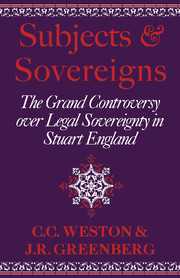Book contents
- Frontmatter
- Contents
- Dedication
- Preface
- 1 The shift in political thought
- 2 The keeper of the kingdom
- 3 The new age of political definition
- 4 That ‘Poisonous Tenet’ of co-ordination
- 5 The curious case of William Prynne
- 6 The idiom of restoration politics
- 7 Co-ordination and coevality in exclusion literature
- 8 The law-makers and the dispensing power
- Appendix: Co-ordination and resistance at the Revolution
- Notes
- Bibliography
- Index
1 - The shift in political thought
Published online by Cambridge University Press: 08 October 2009
- Frontmatter
- Contents
- Dedication
- Preface
- 1 The shift in political thought
- 2 The keeper of the kingdom
- 3 The new age of political definition
- 4 That ‘Poisonous Tenet’ of co-ordination
- 5 The curious case of William Prynne
- 6 The idiom of restoration politics
- 7 Co-ordination and coevality in exclusion literature
- 8 The law-makers and the dispensing power
- Appendix: Co-ordination and resistance at the Revolution
- Notes
- Bibliography
- Index
Summary
Two political ideologies shaped the political thought of Stuart England at mid-century: a political theory of order or an order theory of kingship and what is termed in this study a community-centered view of government. Both were utterly compatible with the outward forms of the traditional governmental structure with its emphasis on a king and two houses of parliament. Neither was completely new since elements of both ideologies were earlier present, but their full articulation and dominant characteristics are properly dated from the extended quarrel between Charles I and the long parliament in the months preceding and following the outbreak of civil war. The exchange of political ideas at this time provided the main inspiration for the pamphleteers whose reflections and speculations on government flooded the England of the 1640s. It is a major theme of this study that the rival ideologies emerging from this amalgam provided thereafter the intellectual framework of seventeenth-century political controversy and, further, that the success of one of them, the community-centered view of government, brought about the radicalization of Stuart political thought.
Each ideology had a distinctive cluster of ideas centering on issues crucial to the political thought of every age. How was a person's allegiance enjoined? Why was he obliged to obey one government rather than another? What ideas, in other words, justified and legitimated the exercise of political authority?
- Type
- Chapter
- Information
- Subjects and SovereignsThe Grand Controversy over Legal Sovereignty in Stuart England, pp. 1 - 7Publisher: Cambridge University PressPrint publication year: 1981



